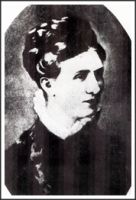Filipina Plaskowicka
«In front of the nation they carry the torch of education»
from poem by Juliusz Słowacki "My Testament"
Why I consider this woman to be an important person?
Filipina Plaskowicka was the founder of the very first rural housewife organization in Poland.
She understood very well specific needs of women in the rural areas, in particular to have a common place to learn, to exchange knowledge and experience about such issues as health, family life or education of their children.
As a teacher in a small elementary school in her village she opposed the forced Russification. It was the time of partitions of Poland. Contrary to the tsar's law from 1871 prohibiting teaching in Polish she spoke and taught in her classes in mother tongue and Russian only separately.
She also used innovative educational methods, which made a great impression on a school inspector. As a result she received the government's approval to open courses for adults. They were the first courses for illiterate adults in the villages.
It is worthy of attention that the organization for rural women founded by Filipina Plaskowicka in 1877 survived two world wars and the communist era, and is currently expanding its activities in the field of preservation of regional tradition and today organizes various activities, such as cultural and educational events or libraries, and helps implement EU projects in remote villages.
The idea of rural women's self-education and emancipation is still alive and continues to be promoted further by the successors of Filipina Plaskowicka.
Filipina Plaskowicka was an enthusiast of egalitarianism, social progress and other ideas of socialism. She worked closely with a well-known socialist activist Ludwik Waryński to found first women's labour organizations which ran evening courses in Polish for adult women.
Biography
Filipina Plaskowicka was born in 1847 in a village nearby Radomyśl /Kiev district/. Due to the difficult financial conditions of her family Filipina never went to school. She was a great example of self-education. At the age of fifteen she became a home teacher, and then she prepared herself for extramural exam for teachers in rural areas. She passed her exams positively and was sent to work in the village Janisławice not far to Skierniewice. As a teacher in a tiny school she gained the rural community's support.
When in the August 8, 1878 she was arrested by the Russian police because of her social activities and engagement in the workers movement in one of Warsaw's factories and imprisoned in the Warsaw Citadel, the Janisławice's community sent a delegation to the Governor-General asking for the release of their teacher .Unfortunately, after two years of investigation, Filipina was sentenced to five years of exile in Siberia. Difficult conditions in which she lived caused serious health problems - she had heart problems and arthritis. For this reason, she decided to quickly marry a friend, a medical student, who wasn supposed to take care of her during the long journey to Siberia. Unfortunately, Filipina died on the way to exile, near Krasoyarsk.
The elementary school in Janisławice proudly bears Filipina Plaskowicka's name in memory of her extraordinary work and achievements, forwarding from gerneration to generation the legacy of its extraordinary patron.
Links
- http://pl.wikipedia.org/w/index.php?title=Filipina_Płaskowicka&oldid=33797967" (available 23.09.2013)
- http://www.skierniewice24.pl/Dobra pani z Janisławic (available 23.09.2013)
- Dioniza Wawrzykowska-Wierciochowa: Płaskowicka, LSW Warszawa 1979
Picture source
The collection of The Independence Traditions Museum in Łódź, Rights: The consent to publish on the website www.unless-women.eu issued by the museum.




